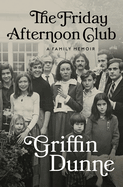
Actor and film director Griffin Dunne's The Friday Afternoon Club is a remarkable feat of storytelling that would surely meet with the approval of the incomparable writers in the author's family, including his father, Dominick Dunne, and his aunt, Joan Didion. Dunne candidly charts his coming-of-age amid cultural touchstones and iconic figures (Carrie Fisher is Dunne's longtime friend and confidante, Linda Lovelace briefly an acting partner) in Hollywood and New York City. He doesn't shy away from depicting his or his family's shortcomings, as when he describes himself as "the little con artist... always looking for the angle to do the least amount of work and get away with as much shit as possible." Dunne vividly describes sibling rivalries, addictions, and rises and falls in fortune with affection, understanding, and a wry and self-deprecating humor.
The memoir's most poignant through line is the fate of Dunne's younger sister, Dominique, whose murder at the hands of an abusive ex-boyfriend hangs like a specter over the family as the highly publicized and painful trial plays out. Dunne captures the anguish of this loss, not just in the immediate aftermath of his sister's death but also in the way that its ripple effects permanently reshape his relationships and perceptions of safety.
The Friday Afternoon Club is an unforgettable voyage through the story of a family who lived very much in the public eye and was quintessentially American in its origins and trajectory. It's a story of immigration, aspiration, excess, redemption, violence, celebrity, and ultimately, tenderness and compassion. --Elizabeth DeNoma, executive editor, DeNoma Literary Services, Seattle, Wash.

